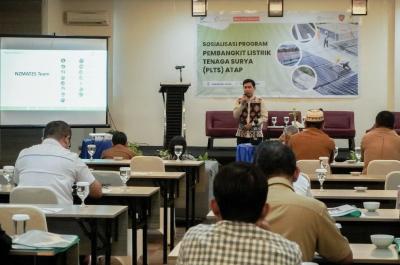
The government continues to promote the use of new and renewable energy (NRE) to reduce the impact of global warming caused by greenhouse gases. For instance, the "One Million Rooftop Solar Power Plants" initiative targets government buildings, households, and industries. This is part of a mass strategy aimed at achieving a 23% new and renewable energy (NRE) mix. In Maluku Province, the rooftop solar program has been promoted since 2020. The Ministry of Energy and Mineral Resources, through the Directorate General of New Renewable Energy and Energy Conservation (EBTKE), has installed rooftop solar systems on eight government buildings.
To further encourage the adoption of rooftop solar systems in Maluku Province, the New Zealand-Maluku Access to Renewable Energy Support (NZMATES) programme held a socialization event for the commercial sector on Tuesday, 6 June 2023. The aim was to highlight the benefits of installing rooftop solar systems to the private sector. In her opening remarks, NZMATES Programme Manager Safitri Y. Baharuddin reiterated NZMATES' commitment to supporting the adoption of affordable, reliable, and renewable energy in Maluku Province.
"We support the rooftop solar programme implemented by the Directorate General of EBTKE. Collaboration and coordination between NZMATES, the Maluku Provincial Department of Energy and Mineral Resources, and the Directorate General of EBTKE are essential to ensure the program's successful implementation and utilization. NZMATES is also committed to collaborating with partners and any parties interested in supporting renewable energy development in Maluku," said Safitri.
Praptono Adhi, Coordinator of Investment and Cooperation at the Directorate of Various NRE, Directorate General of EBTKE, participated virtually and presented the policies and economics of rooftop solar systems. Adhi elaborated on the government's commitment to reducing carbon emissions, addressing the energy crisis, and the potential of NRE through the use of clean energy. He also explained how the public can install rooftop solar systems through service providers.
Following Adhi's presentation, Maman Sulaeman, Senior Manager of Commerce and Customer Management at PLN MMU, welcomed the trend of rooftop solar installations in major cities, despite the current installation costs being a challenge. Maman noted that private sector cooperation significantly boosts the energy mix, particularly in utilizing NRE as a primary energy source. PLN MMU is also striving to use efficient energy sources to power the MMU region.
Representing the Head of the Maluku Provincial Department of Marine and Fisheries (DKP), Mulyadi, Functional Planning Coordinator at DKP, shared his experiences using rooftop solar systems at the DKP building. Since the installation, there have been notable benefits, such as increased property value due to the new energy source and significant cost savings, with monthly electricity bills reduced by 40-50%. Mulyadi also highlighted the need for budget support to install rooftop solar systems at the technical implementation units of the Department of Marine and Fisheries, maximizing their benefits for community needs.
The socialisation event concluded with a presentation from Hafidh Amrullah, an economist at Bank Indonesia (BI), and a discussion between the speakers and attendees. Hafidh discussed BI's role as the central bank in green economic policies, such as BI's green finance initiative, which started in 2010 and was reactivated in 2019.
This policy is based on the view that climate change is the greatest long-term risk, yet awareness of climate change remains relatively low. Climate change poses a threat to the global economy, but Indonesia has a significant opportunity to transition to a low-carbon economy through green investment using NRE infrastructure to drive economic growth. Maluku Province can play a key role in this transition, given its substantial NRE potential.
